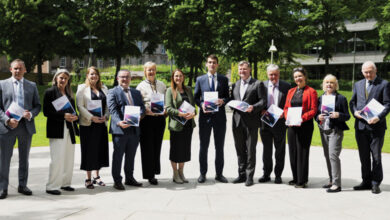Imagine bringing over 30Mb of broadband to regional and rural Ireland
 Brian O’Donohoe, Commercial Director of Imagine Communications Group, explains how the adoption of long-term evolution (LTE) technology can expand and speed up Irish broadband infrastructure.
Brian O’Donohoe, Commercial Director of Imagine Communications Group, explains how the adoption of long-term evolution (LTE) technology can expand and speed up Irish broadband infrastructure.
Imagine Communications Group’s 4G fixed wireless solution is the fastest, most cost effective way to deliver a 30Mb, and over, broadband service to regional and rural Ireland.
Ireland is a €4 billion telecoms market that has been historically characterised by slow and expensive fixed and mobile broadband services. Next generation high speed fixed and mobile broadband services require new infrastructure (fibre, cable, 4G LTE fixed and mobile). There has been huge investment in wireless technologies over the last number of years by the major equipment vendors such as Huawei, Ericsson, Nokia Siemens and ZTE. This has culminated in one dominant global standard called LTE which has been developed and is deployed in over 145 networks in 66 countries across the world already.
The Government’s National Broadband initiative dictates that 30Mb download speed should be available to 100 per cent of the population by 2015. In many economies across the globe, LTE is the ‘new copper’ providing high speed broadband outside dense urban areas. With 50 per cent of the population spread across 99 per cent of the geography of Ireland, it is agreed that 4G wireless is the most feasible solution for the regional/rural market. Fibre/cable will feature heavily in dense urban areas but is not economically viable for most of Ireland’s population with its distributed geographic footprint.
A significant amount of the legacy eircom network is unable to carry highspeed broadband even with an expensive upgrade. This is comparable to countries such as Denmark where wireless services are also essential in delivering quality broadband to the regions. Therefore, having the required amount and type of radio spectrum and being able to deploy it efficiently in bridging the digital divide is pivotal to the success of the economy outside the larger urban conurbations.
A further advantage of LTE is that when deployed in smaller towns its coverage footprint will also allow services to be provided to the surrounding hinterlands for many kilometres, which is obviously not the case with alternative high speed infrastructures such as fibre or cable.
Imagine is a leading alternative operator in the Irish telecommunication market providing voice, broadband and bespoke services to business and residential customers using its own independent national Fixed Wireless Access (FWA) network as well as utilising eircom’s fixed network. Imagine has consolidated the Irish fixed wireless market with its acquisitions of Irish Broadband from NTR and its purchase of Clearwire from major US wireless company Clearwire Inc. Imagine controls highly attractive assets that, in addition to a fully deployed national wireless infrastructure, comprise up to 240MHz of the available 4G LTE spectrum in the 3.5GHz LTE frequency bands. ‘Imagine’s demo shows LTE running in a 20Mhz channel, the company’s network set for launch in early 2014 will actually use higher capacity 40MHz channels and eventually 60MHz giving very substantial capacity increases as Imagine maximises its spectrum to ensure that Ireland stays at the front of this global technology.
Spectrum
This quantity of radio spectrum allows for the provision of fixed and mobile services including high-speed broadband internet access and voice telephony using LTE. Ireland is yet to deploy LTE and while some of the mobile operators are very likely to deploy LTE as a mobile service this is quite different from providing LTE as a fixed network alternative and being able to consistently deliver the speed and customer experience that high speed broadband necessitates. In this context, only Imagine has enough LTE spectrum to provide this type of broadband experience to customers in the regions.
The demographics of the market and economics of the various infrastructures dictate that regional and rural Ireland, representing around 40 per cent of the fixed market, will be serviced by 4G fixed wireless services. This is the area of the market currently least serviced with the majority of customers receiving sub-3Mb broadband over the incumbent copper network or relying on 3G mobile broadband with its latency and speed limitations. It is in these areas that Imagine initially intends to target its LTE roll-out.
Regional Ireland is covered with small towns that have multiple businesses located on their outskirts, which have been left in a broadband void due to being too far from the existing infrastructure or indeed there being no infrastructure capable of delivering quality broadband in the area at all. This is reflected in the fact that over 20,000 Irish businesses are still not online and many which are have a wholly inadequate service. Imagine’s LTE network will enable these business to join the digital economy and avail of the cloud services that are essential to the future of Irish business.
Rural Ireland, and the many farming and agri-businesses within it, have been left behind in terms of broadband infrastructure. This is an area of increasing concern to those within these businesses and communities as the technology available in these sectors and the efficiency, and traceability, that it promotes are essential to their ongoing competitiveness within Ireland and internationally. Quality broadband connectivity is essential to enable these technologies. The extensive reach of the latest LTE technologies now makes it possible and cost-effective to deliver connectivity to the farms of Ireland and their associated ecosystems.
LTE is a global standard that provides global economies of scale and allows affordable high speed broadband to be deployed in areas where the economics of fixed infrastructures (e.g. fibre and cable) simply do not work. Its all-IP architecture from end-to-end allows for scalability nationally and it is supported in many frequency bands from 900MHz to 3.5GHz. It is being combined with other modes and in multi-band devices (800MHz, 900MHz, 1.8GHz and 2.1GHz) allowing for seamless interoperability with other LTE networks all within one device.
Spectrally, it is very efficient with current peak download speeds of 110Mb and 10MB upload in a 20MHz channel and a committed global roadmap into the future showing speeds of 1.6GHz from equipment vendors e.g. Nokia Siemens Networks. This easily exceeds the requirements needed to meet the Government’s minimum objectives in the regional/rural Irish market and allows for these parts of our economy to grow and evolve in line with global trends and requirements without the need for further new infrastructure to be deployed.
Why Imagine?
Imagine’s consolidation of the fixed wireless industry, its depth of spectrum, its existing network, and its knowledge of using wireless technologies to provide high speed broadband to homes and businesses, position it perfectly to deliver for Ireland. Imagine’s roll-out of 4G LTE infrastructure directly addresses the regional/rural broadband need as well as providing a platform for the provision of wholesale services to other carriers.
For more details contact Imagine at +353 (0)1 437 5000 or see us on www.imagine.ie






